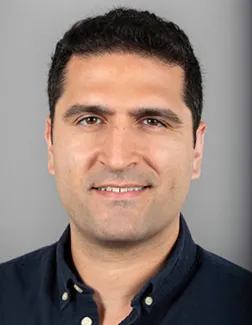

Information
Related Research Units
Research Overview
Dr. Mayourian is Founder and Director of the Congenital Heart Artificial Intelligence (CHAI) Lab at Boston Children's Hospital. He has published seminal AI papers in pediatric and adult congenital heart disease, with first-author publications in top-tier journals such as Circulation, JACC, European Heart Journal, and Lancet: Digital Health. This work represents the first applications of AI-enabled electrocardiograms for pediatric cardiology. Please visit the CHAI Lab Website for more details on its mission and research objectives.
Research Background
Dr. Mayourian received his BE and ME in Chemical Engineering at Cooper Union. He then completed his MD/PhD at Mount Sinai, where his PhD was focused on developing computational models of cardiac electrophysiology, and tissue engineering to develop novel cardio-therapies. He has completed his internship and residency in Pediatric at Boston Children's Hospital, and is currently undergoing Pediatric Cardiology and Advanced Electrophysiology Training.
Publications
- Artificial Intelligence-Enabled Electrocardiograms: Do 15-Lead Studies Improve Model Performance? JACC Adv. 2025 Jun 25; 4(7):101866. View Abstract
- Artificial Intelligence-Enabled ECG to Detect Congenitally Corrected Transposition of the Great Arteries. Pediatr Cardiol. 2025 Jun 16. View Abstract
- Dysregulation of N-terminal acetylation causes cardiac arrhythmia and cardiomyopathy. Nat Commun. 2025 Apr 16; 16(1):3604. View Abstract
- Development and Validation of a Novel Deep Learning Model to Predict Pharmacologic Closure of Patent Ductus Arteriosus in Premature Infants. J Am Soc Echocardiogr. 2025 Apr 11. View Abstract
- Electrocardiogram-based deep learning to predict left ventricular systolic dysfunction in paediatric and adult congenital heart disease in the USA: a multicentre modelling study. Lancet Digit Health. 2025 Apr; 7(4):e264-e274. View Abstract
- Electrocardiogram-based deep learning to predict mortality in paediatric and adult congenital heart disease. Eur Heart J. 2025 Mar 03; 46(9):856-868. View Abstract
- Expert-Level Automated Diagnosis of the Pediatric ECG Using a Deep Neural Network. JACC Clin Electrophysiol. 2025 Mar 01. View Abstract
- Artificial Intelligence-Enabled Electrocardiogram Predicts Sudden Cardiac Death in Repaired Tetralogy of Fallot. JACC Clin Electrophysiol. 2025 Mar; 11(3):593-595. View Abstract
- Cardiac Applications of CRISPR/AAV-Mediated Precise Genome Editing. bioRxiv. 2024 Dec 04. View Abstract
- Electrocardiogram-Based Deep Learning to Predict Mortality in Repaired Tetralogy of Fallot. JACC Clin Electrophysiol. 2024 Dec; 10(12):2600-2612. View Abstract
- Deep Learning-Based Electrocardiogram Analysis Predicts Biventricular Dysfunction and Dilation in Congenital Heart Disease. J Am Coll Cardiol. 2024 Aug 27; 84(9):815-828. View Abstract
- Dysregulation of N-terminal acetylation causes cardiac arrhythmia and cardiomyopathy. Res Sq. 2024 Jul 19. View Abstract
- Efficient and reproducible generation of human iPSC-derived cardiomyocytes and cardiac organoids in stirred suspension systems. Nat Commun. 2024 Jul 15; 15(1):5929. View Abstract
- Pediatric Electrocardiogram-Based Deep Learning to Predict Secundum Atrial Septal Defects. Pediatr Cardiol. 2025 Jun; 46(5):1235-1240. View Abstract
- Development and Validation of a Mortality Risk Score for Repaired Tetralogy of Fallot. J Am Heart Assoc. 2024 Jun 18; 13(12):e034871. View Abstract
- Child opportunity and outcomes in pediatric critical asthma: A multicenter analysis. J Allergy Clin Immunol Pract. 2024 Aug; 12(8):2187-2189. View Abstract
- Efficient and reproducible generation of human iPSC-derived cardiomyocytes using a stirred bioreactor. bioRxiv. 2024 Feb 28. View Abstract
- Pediatric ECG-Based Deep Learning to Predict Left Ventricular Dysfunction and Remodeling. Circulation. 2024 03 19; 149(12):917-931. View Abstract
- Social Drivers of Health and Pediatric Extracorporeal Membrane Oxygenation Outcomes. Pediatrics. 2023 Dec 01; 152(6). View Abstract
- An improved reporter identifies ruxolitinib as a potent and cardioprotective CaMKII inhibitor. Sci Transl Med. 2023 06 21; 15(701):eabq7839. View Abstract
- Insight into the Role of the Child Opportunity Index on Surgical Outcomes in Congenital Heart Disease. J Pediatr. 2023 08; 259:113464. View Abstract
- Computational design of custom therapeutic cells to correct failing human cardiomyocytes. Front Syst Biol. 2023; 3. View Abstract
- PPARdelta activation induces metabolic and contractile maturation of human pluripotent stem cell-derived cardiomyocytes. Cell Stem Cell. 2022 04 07; 29(4):559-576.e7. View Abstract
- In silico Cell Therapy Model Restores Failing Human Myocyte Electrophysiology and Calcium Cycling in Fibrotic Myocardium. Front Physiol. 2021; 12:755881. View Abstract
- Adult human cardiac stem cell supplementation effectively increases contractile function and maturation in human engineered cardiac tissues. Stem Cell Res Ther. 2019 12 04; 10(1):373. View Abstract
- FTO-Dependent N6-Methyladenosine Regulates Cardiac Function During Remodeling and Repair. Circulation. 2019 01 22; 139(4):518-532. View Abstract
- Joshua Mayourian: Rising to the Challenge. Circ Res. 2018 05 25; 122(11):1494-1495. View Abstract
- Functional and transcriptomic insights into pathogenesis of R9C phospholamban mutation using human induced pluripotent stem cell-derived cardiomyocytes. J Mol Cell Cardiol. 2018 06; 119:147-154. View Abstract
- Exosomal microRNA-21-5p Mediates Mesenchymal Stem Cell Paracrine Effects on Human Cardiac Tissue Contractility. Circ Res. 2018 03 30; 122(7):933-944. View Abstract
- Physiologic, Pathologic, and Therapeutic Paracrine Modulation of Cardiac Excitation-Contraction Coupling. Circ Res. 2018 01 05; 122(1):167-183. View Abstract
- Cardiac Tissue Engineering Models of Inherited and Acquired Cardiomyopathies. Methods Mol Biol. 2018; 1816:145-159. View Abstract
- An Introduction to Computational Modeling of Cardiac Electrophysiology and Arrhythmogenicity. Methods Mol Biol. 2018; 1816:17-35. View Abstract
- Experimental and Computational Insight Into Human Mesenchymal Stem Cell Paracrine Signaling and Heterocellular Coupling Effects on Cardiac Contractility and Arrhythmogenicity. Circ Res. 2017 Aug 04; 121(4):411-423. View Abstract
- Modeling Electrophysiological Coupling and Fusion between Human Mesenchymal Stem Cells and Cardiomyocytes. PLoS Comput Biol. 2016 07; 12(7):e1005014. View Abstract